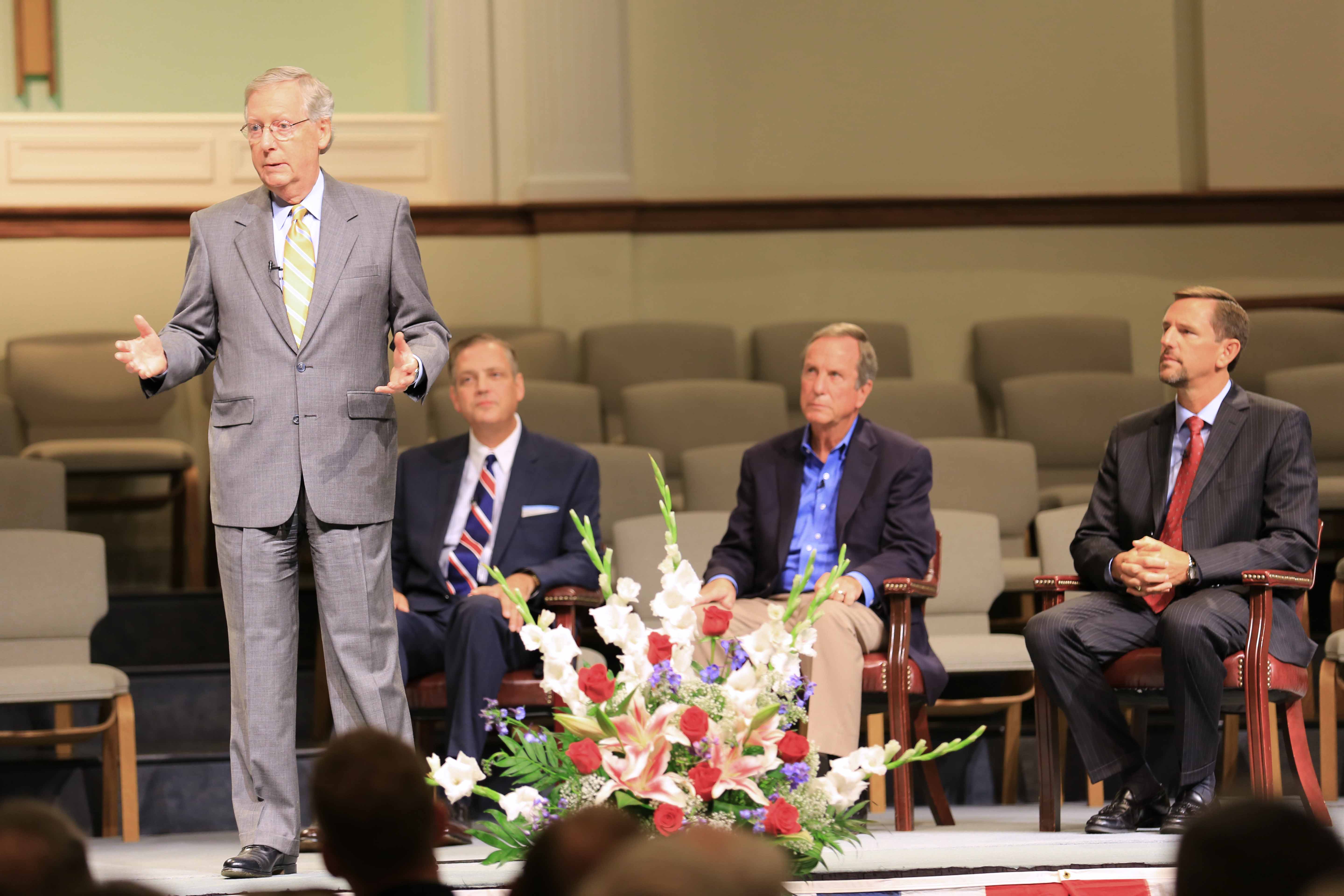
BOWLING GREEN, Ky. (BP) — Evangelical Christians in Kentucky have “a clear choice in the U.S. Senate race” to preserve religious values, said Senate Minority Leader Mitch McConnell in an issues forum with Kentucky evangelical leaders, Aug. 14.
“Elections have consequences,” said McConnell, describing the challenges facing voters after President Barack Obama’s election in 2008 resulted in a trillion-dollar stimulus and the implementation of the Affordable Care Act.
“We ought to go in a different direction,” the five-term Republican senator said, “and there’s only one thing that can be done in 2014, and that would be to change the United States Senate.”
McConnell participated in a forum discussion at Eastwood Baptist Church in Bowling Green, Ky., with R. Albert Mohler Jr., president of The Southern Baptist Theological Seminary; Paul Chitwood, executive director of the Kentucky Baptist Convention; and Bob Russell, retired senior pastor of Southeast Christian Church, Louisville. The Democratic challenger for McConnell’s seat, Kentucky Secretary of State Alison Lundergan Grimes, did not respond to the invitation, which remains open for two other events.
“Given the gravity of issues facing our nation — issues concerning the big moral issues of our day, related to religious liberty and other concerns — the three of us felt it would be important to bring the issues before the people of Kentucky,” said Mohler, clarifying that the forum was “not a political event, but we live in a world in which many of these questions end up being political questions.”
“One of the greatest Christian concerns” Mohler asked McConnell, is how Christians should react to Senate Democrats attempting to rescind the Religious Freedom Restoration Act in wake of the recent Supreme Court decision siding with the religious freedom claims by Hobby Lobby and Conestoga Wood Specialties against the contraceptive mandate in the Affordable Care Act.
“People on the political left believe that freedom of religion means the freedom to go to church,” said McConnell, who told the crowd he was baptized at age 8 in a Southern Baptist church and is the great-grandson of a Presbyterian circuit-riding preacher.
“I think freedom of religion means the freedom to practice religion, not just to show up on Sunday but to live that kind of life seven days a week.”
Recounting the narrow Supreme Court decision to uphold prayer before town council meetings in Greece, N.Y., McConnell assured the audience that a Senate majority would allow Republicans to confirm future Supreme Court nominees.
When Russell asked if the issue of abortion was a litmus test for Supreme Court nominees, McConnell responded that his pro-life convictions play an important role in casting his vote but that it’s not a litmus test.
“The advances in technology have made it clearer and clearer and clearer that [abortion] is personal,” McConnell said, affirming that he is “100 percent pro-life.”
Mohler also questioned McConnell on his support for religious liberty on issues of marriage and sexuality, citing as examples the Supreme Court’s 2013 decisions on same-sex marriage and President Obama’s executive order that prohibits federal contractors from discriminating on the basis of sexual orientation.
Agreeing with Mohler that such policies are a threat to religious liberty, McConnell said the solution to defining marriage as between one man and one woman is assuring that “the people who get elected to make those decisions make the decisions,” rather than letting the court system decide.
Russell, the retired pastor at McConnell’s home church, asked McConnell about his stance regarding immigration reform in light of Old Testament passages that instruct God’s people to care for “the strangers and aliens.”
McConnell remarked on his wife’s journey to America as an Asian immigrant and responded, “Legal immigration is an important part of making America what it is; storming our borders is something else.”
He outlined his priorities on immigration as securing the border and improving legal immigration laws, but not giving “preferential treatment” to those who cross the border illegally. “We cannot handle all the troubled young people whose desperate parents wanted to send them to America,” he said.
Russell also pointed to the actions of the militant group ISIS persecuting Christians and Muslim minorities in Iraq and Syria. He asked McConnell how the Senate could respond to the crisis.
The persecution of Christians in the Middle East is “the inevitable consequence of no residual presence” of U.S. forces in Iraq, McConnell said, stating that changing spending and lobbying the executive branch to restore military involvement is the extent of the Senate’s capabilities.
“We shouldn’t have left.”
Chitwood noted the Christian imperative to care for the poor and questioned McConnell on how another term for the Senate incumbent could affect Kentucky jobs.
“The way to lift people up is with a job,” McConnell said, but increased borrowing and spending makes “prosperity evaporate.” Stating that his status as a party leader in the United States Senate is an advantage that helps employ workers in the Bluegrass state, McConnell said President Obama must learn to work across the aisle with a hopeful GOP majority.
McConnell, responding to Chitwood’s inquiry about adoption and foster care, said he is “deeply involved in adoption issues.” The care of orphans and wards of the state should be encouraged through tax breaks, he said.
McConnell is scheduled to appear at the issues forums in Louisville, Aug. 20, at Highview Baptist Church, East Campus, with Mohler and Chitwood, and in Somerset, Aug. 28, at Somerset Christian School, with Mohler and Russell.
–30–
S. Craig Sanders writes for Southern Baptist Theological Seminary in Louisville, Ky. Get Baptist Press headlines and breaking news on Twitter (@BaptistPress), Facebook (Facebook.com/BaptistPress) and in your email (baptistpress.com/SubscribeBP.asp).
















